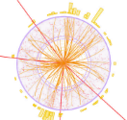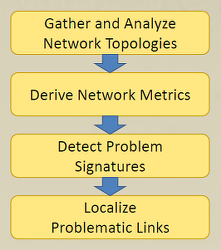



Pythia Network Diagnosis Infrastructure
PuNDIT will integrate and enhance several software tools needed by the High Energy Physics (HEP) community to provide an infrastructure for identifying, diagnosing and localizing network problems. In particular, the core of PuNDIT is the Pythia tool that uses perfSONAR data to detect, identify and locate network performance problems. The Pythia algorithms, originally based on one-way latency and packet loss, will be re-implemented incorporating the lessons learned from its first release and augmenting those algorithms with additional metrics from perfSONAR throughput and traceroute measurements. The PuNDIT infrastructure will build upon other popular open-source tools including smokeping, ESnet's Monitoring and Debugging Dashboard (MaDDash) and the Open Monitoring Distribution (OMD) to provide a user-friendly network diagnosis framework.

The PuNDIT research project is a collaboration between Georgia Tech and University of Michigan funded by the National Science Foundation under award numbers 1440571 and 1440585.


PuNDIT aims to:

Uses a lightweight process on each perfSONAR agent for detection
Uses a central server for problem event repository and for localization algorithm
Current PuNDIT participants: University of Michigan, Michigan State University, Indiana University, ESnet, University of Illinois at Urbana–Champaign, Oklahoma University, Georgia Institute of Technology, University of Nebraska-Lincoln, University of Texas-Arlington, University of Chicago, Brookhaven National Laboratory, Lawrence Berkeley National Laboratory.